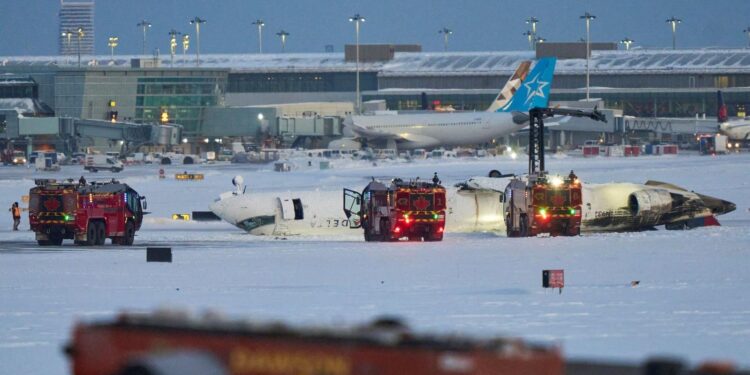Photo by Geoff Robins / AFP) (Photo by GEOFF ROBINS/AFP via Getty Images
AFP via Getty Images
Canada never asked to be America’s emergency responder today. But history has a way of making certain roles unavoidable
Sunday saw Delta Flight 4819—a regional jet originating from Minneapolis—crash into Canada’s largest airport at Toronto Pearson. After landing, the plane flipped on the runway and injured 18 passengers, some seriously. People spoke of hanging like bats upside down.
Thankfully, everyone survived. Given the conditions, how extraordinary.
As they often do, however, Canadians did not stop to debate whether the plane was American or its passengers were mostly from south of the border. They just went about their business: stabilized the situation, got people to safety, and prevented further disaster.
The parallel to U.S.-Canada relations could not be more apparent.
For years, Canada has been America’s steady hand in times of turbulence.
When U.S. airspace shut down on 9/11, Canada took in 33,000 stranded Americans across the country without hesitation. When California wildfires raged, Canadian water bombers flew south to assist. There are plenty more examples.
Even as political leaders south of the border fumble their way through unnecessary trade wars, isolationist posturing, and other myopic goals, Canada remains a place of refuge, resilience, and a consistent, stable presence.
And yet, Washington’s recent behavior toward Ottawa feels less like a cooperative partnership and more like a captain blaming their co-pilot for an engine failure they themselves caused. Is this what you call leadership?
An Emergency Landing or a Crash of Relations?
Much like Flight 4819’s unexpected belly flop onto Toronto Pearson’s tarmac, America’s approach to its northern neighbor has been anything but smooth recently.
Take the threat of 25% tariffs being slapped on Canadian imports as of March 3. The Trump administration cites ‘national security concerns’ as the reason for the tariffs. Canada—one of the United States’ most reliable allies—is suddenly cast as an economic antagonist, lumped into the same category as nations actively working against American interests.
The logic is as upside-down as that inverted Delta jet on the runway at Toronto Pearson Airport.
Yet the facts are clear, particularly when it comes to trade.
In 2024, the U.S. trade deficit surged to $918 billion, with China and Mexico leading the list of contributors. However, Canada’s role in this narrative is notably different.
According to the President’s Executive Office, the U.S. trade deficit with Canada stood at $63.3 billion in 2024, placing Canada ninth among all trade partners. When you exclude oil and gas, the U.S. enjoyed a $30 billion trade surplus with Canada, which includes exporting U.S. goods such as computers, electronics, machinery, chemicals, and food.
Don’t skip over that last point—$30 billion SURPLUS!
And that so-called “deficit” when you factor in oil and gas? It’s hardly an economic drain. Most of this fuel is refined in the U.S., supporting American industries, keeping people employed, and helping to keep gas prices down. Good luck to the U.S. in finding cheaper energy elsewhere. Canada already sells it to the U.S. at reduced rates thanks to the WCS-WTI differential, among other factors.
Furthermore, Canada is the top export destination for over 30 U.S. states. That’s 60% of all states. Trade between the U.S. and Canada creates millions of jobs on both sides of the world’s longest unprotected border, a testament to how balanced and essential this partnership is.
And yet, instead of strengthening ties, Washington is busy treating Canada like an economic adversary. When did Canada become the Bond villain in this movie?
What America Could Learn from Toronto Pearson
If leadership is best measured in a crisis, Canada’s handling of this moment—both at Pearson and in trade negotiations—starkly contrasts America’s political theatrics.
Consider the following:
The ground crew at Toronto Pearson Airport did not wait for a national debate on whether they should assist an American aircraft. They did not demand a press conference before taking action. They simply did the work. Meanwhile, Washington’s approach to international relations has become a game of brinkmanship that prioritizes headlines and bullying over outcomes and partnerships.
Canada did not grill every passenger before deciding whether to help. It didn’t ask if they were Democrats or Republicans, Minnesotans or Ontarians. They were people in need. The U.S., on the other hand, now increasingly treats its allies with suspicion while questioning democratic partnerships that have been the bedrock of stability for decades.
Toronto’s emergency response teams didn’t need a dozen pre-meetings, post-meetings, and subcommittees to determine whether assisting an upside-down airplane was a good idea. They just acted. Washington, by contrast, continues to exhibit political theater—where gestures, threats, and soundbites take precedence over friendship, over doing something in the best interest of both countries.
A Nation That Remembers
No one died today. What a thing to say when it comes to an airplane crash.
Thus, a moment like this begs the question: What happens when the next crisis happens?
Will Canada be there to help its American neighbor once again? Likely, yes. It’s in the country’s DNA to be pragmatic and solution-oriented and, well, nice. But it won’t come without some recalculations. Canadians may be nice, but they’re quite logical, too.
Canadians—just like those first responders on the runway—will remember.
Canadians will remember who showed up when help was needed. Canadians will remember who bullied, threatened, or mandated. They will remember who treated them as a partner versus a pawn.
Real friendship isn’t just about being there when things are easy.
It’s about how you treat someone when the plane flips upside down.
Source link : http://www.bing.com/news/apiclick.aspx?ref=FexRss&aid=&tid=67b3f9ec69924a0ba51f1245afe17d3b&url=https%3A%2F%2Fwww.forbes.com%2Fsites%2Fdanpontefract%2F2025%2F02%2F17%2Famericas-relationship-with-canada-is-as-upside-down-as-that-delta-jet%2F&c=10195333433210729633&mkt=en-us
Author :
Publish date : 2025-02-17 12:11:00
Copyright for syndicated content belongs to the linked Source.












